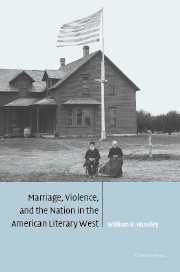Book contents
- Frontmatter
- Contents
- List of illustrations
- Acknowledgments
- Introduction
- 1 Western unions
- 2 Turner's rhetorical frontier
- 3 Marrying for race and nation: Wister's omniscience and omissions
- 4 Polygamy and empire: Grey's distinctions
- 5 Unwedded West: Cather's divides
- 6 Accident and destiny: Fitzgerald's fantastic geography
- 7 Promises and betrayals: Joan Didion and Wallace Stegner
- Afterword
- Notes
- Index
2 - Turner's rhetorical frontier
Published online by Cambridge University Press: 22 September 2009
- Frontmatter
- Contents
- List of illustrations
- Acknowledgments
- Introduction
- 1 Western unions
- 2 Turner's rhetorical frontier
- 3 Marrying for race and nation: Wister's omniscience and omissions
- 4 Polygamy and empire: Grey's distinctions
- 5 Unwedded West: Cather's divides
- 6 Accident and destiny: Fitzgerald's fantastic geography
- 7 Promises and betrayals: Joan Didion and Wallace Stegner
- Afterword
- Notes
- Index
Summary
The poet turns the world to glass, and shows us all things in their right series and procession … he stands one step nearer to things, and sees the flowing or metamorphosis …
Ralph Waldo Emerson, “The Poet”Stand at Cumberland Gap and watch the procession of civilization, marching single file – the buffalo following the trail to the salt springs, the Indian, the fur-trader and hunter, the cattle-raiser, the pioneer farmer – and the frontier has passed by. Stand at South Pass in the Rockies a century later and see the same procession …
Turner, “The Significance of the Frontier in American History”No text has been more influential with regard to the writing and debating of western American significance than Frederick Jackson Turner's 1893 essay “The Significance of the Frontier in American History.” The elastic and contradictory terms of Turner's analysis are largely responsible for the chorus of debate in the last three decades about whether the West is best understood as an idea, a place, or a historical process – and what kind. While Turner has had perhaps the greatest influence on American historiography of any American historian, he is also the most discredited. “Because Turner's frontier thesis necessarily ended in 1890,” writes William Cronon, “it left historians few clues about what to do with the West in the twentieth century: in an odd sense, Turnerian western history almost literally ended at the very moment that Turner created the field.” It also left Americans few clues about what to do with democracy if its supposed source was gone.
- Type
- Chapter
- Information
- Publisher: Cambridge University PressPrint publication year: 2002

